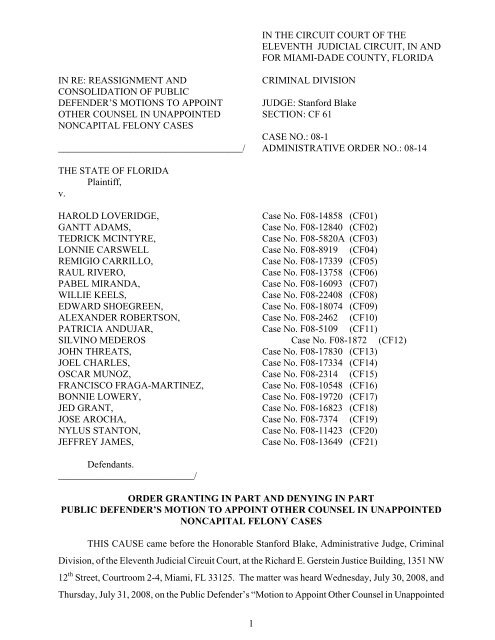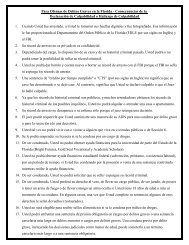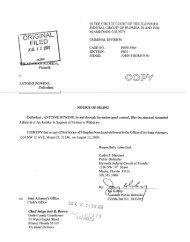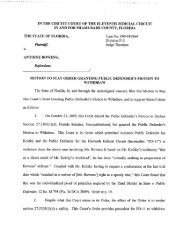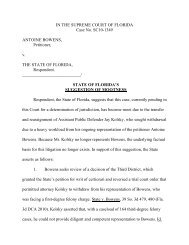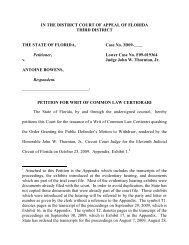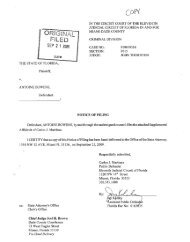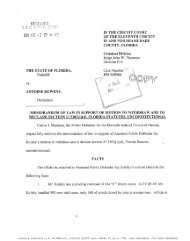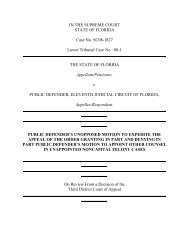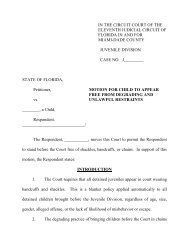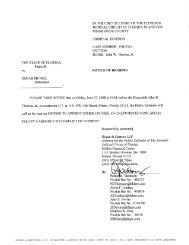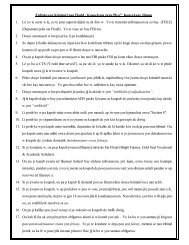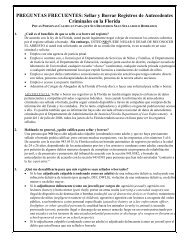Order on Motion to Appoint Other Counsel - Miami Dade County ...
Order on Motion to Appoint Other Counsel - Miami Dade County ...
Order on Motion to Appoint Other Counsel - Miami Dade County ...
You also want an ePaper? Increase the reach of your titles
YUMPU automatically turns print PDFs into web optimized ePapers that Google loves.
IN THE CIRCUIT COURT OF THE<br />
ELEVENTH JUDICIAL CIRCUIT, IN AND<br />
FOR MIAMI-DADE COUNTY, FLORIDA<br />
IN RE: REASSIGNMENT AND<br />
CRIMINAL DIVISION<br />
CONSOLIDATION OF PUBLIC<br />
DEFENDER’S MOTIONS TO APPOINT JUDGE: Stanford Blake<br />
OTHER COUNSEL IN UNAPPOINTED SECTION: CF 61<br />
NONCAPITAL FELONY CASES<br />
CASE NO.: 08-1<br />
______________________________________/ ADMINISTRATIVE ORDER NO.: 08-14<br />
THE STATE OF FLORIDA<br />
Plaintiff,<br />
v.<br />
HAROLD LOVERIDGE,<br />
Case No. F08-14858 (CF01)<br />
GANTT ADAMS,<br />
Case No. F08-12840 (CF02)<br />
TEDRICK MCINTYRE,<br />
Case No. F08-5820A (CF03)<br />
LONNIE CARSWELL Case No. F08-8919 (CF04)<br />
REMIGIO CARRILLO,<br />
Case No. F08-17339 (CF05)<br />
RAUL RIVERO,<br />
Case No. F08-13758 (CF06)<br />
PABEL MIRANDA,<br />
Case No. F08-16093 (CF07)<br />
WILLIE KEELS,<br />
Case No. F08-22408 (CF08)<br />
EDWARD SHOEGREEN,<br />
Case No. F08-18074 (CF09)<br />
ALEXANDER ROBERTSON, Case No. F08-2462 (CF10)<br />
PATRICIA ANDUJAR, Case No. F08-5109 (CF11)<br />
SILVINO MEDEROS Case No. F08-1872 (CF12)<br />
JOHN THREATS,<br />
Case No. F08-17830 (CF13)<br />
JOEL CHARLES,<br />
Case No. F08-17334 (CF14)<br />
OSCAR MUNOZ, Case No. F08-2314 (CF15)<br />
FRANCISCO FRAGA-MARTINEZ,<br />
Case No. F08-10548 (CF16)<br />
BONNIE LOWERY,<br />
Case No. F08-19720 (CF17)<br />
JED GRANT,<br />
Case No. F08-16823 (CF18)<br />
JOSE AROCHA, Case No. F08-7374 (CF19)<br />
NYLUS STANTON,<br />
Case No. F08-11423 (CF20)<br />
JEFFREY JAMES,<br />
Case No. F08-13649 (CF21)<br />
Defendants.<br />
____________________________/<br />
ORDER GRANTING IN PART AND DENYING IN PART<br />
PUBLIC DEFENDER’S MOTION TO APPOINT OTHER COUNSEL IN UNAPPOINTED<br />
NONCAPITAL FELONY CASES<br />
THIS CAUSE came before the H<strong>on</strong>orable Stanford Blake, Administrative Judge, Criminal<br />
Divisi<strong>on</strong>, of the Eleventh Judicial Circuit Court, at the Richard E. Gerstein Justice Building, 1351 NW<br />
12 th Street, Courtroom 2-4, <strong>Miami</strong>, FL 33125. The matter was heard Wednesday, July 30, 2008, and<br />
Thursday, July 31, 2008, <strong>on</strong> the Public Defender’s “Moti<strong>on</strong> <strong>to</strong> <strong>Appoint</strong> <strong>Other</strong> <strong>Counsel</strong> in Unappointed<br />
1
N<strong>on</strong>capital Fel<strong>on</strong>y cases.” Post hearing memoranda was provided <strong>to</strong> the Court by PD-11 and SAO-11<br />
<strong>on</strong> August 11, 2008.<br />
The Public Defender of the Eleventh Judicial Circuit (PD-11) filed their moti<strong>on</strong> and a<br />
“Certificate of C<strong>on</strong>flict of Interest,” in fel<strong>on</strong>y cases. This Court, through Administrative <str<strong>on</strong>g>Order</str<strong>on</strong>g> No. 08-<br />
14 by Chief Judge Joseph P. Farina, reassigned and c<strong>on</strong>solidated these moti<strong>on</strong>s and all subsequent<br />
moti<strong>on</strong>s c<strong>on</strong>taining identical issues for all purposes necessary <strong>to</strong> effect the prompt dispositi<strong>on</strong> of cases<br />
and c<strong>on</strong>trol the docket in the Eleventh Judicial Circuit.<br />
PD-11 asserts that accepting appointments <strong>to</strong> n<strong>on</strong>capital fel<strong>on</strong>y cases at this time would create<br />
c<strong>on</strong>flicts of interest with previously appointed clients and newly appointed clients in cases other than<br />
n<strong>on</strong>capital fel<strong>on</strong>y cases. PD-11 argues that the underfunding of the Public Defender’s Office has<br />
created excessive caseloads such that PD-11 cannot ethically or legally accept additi<strong>on</strong>al n<strong>on</strong>capital<br />
fel<strong>on</strong>y cases at this time. In resp<strong>on</strong>se, the State At<strong>to</strong>rney’s Office (SA0-11) argues that that the<br />
granting of this moti<strong>on</strong> will create chaos in the criminal justice system and lead <strong>to</strong> the dismissal of<br />
serious and violent fel<strong>on</strong>y cases. SAO-11 opposes the method that PD-11 has chosen <strong>to</strong> air its<br />
grievances, but does not dispute the fact that PD-11 has felt a severe reducti<strong>on</strong> in its budget, nor the<br />
fact that PD-11’s c<strong>on</strong>cerns pertaining <strong>to</strong> underfunding are based <strong>on</strong> the Public Defender’s sincere<br />
c<strong>on</strong>victi<strong>on</strong>s.<br />
I<br />
SAO-11 c<strong>on</strong>tends it has a right and a duty <strong>to</strong> resp<strong>on</strong>d <strong>to</strong> PD-11’s moti<strong>on</strong>. It bases this right <strong>on</strong><br />
Secti<strong>on</strong> 27.02, Fla. Stat., which states that “[t]he state at<strong>to</strong>rney shall appear in the circuit and county<br />
courts within his or her judicial circuit and prosecute or defend <strong>on</strong> behalf of the state all suits,<br />
applicati<strong>on</strong>s, moti<strong>on</strong>s, civil or criminal, in which the state is a party, except as provided in chapters 39,<br />
984, and 985.” Although SAO-11 relies <strong>on</strong> Secti<strong>on</strong> 27.02, Fla. Stat., <strong>to</strong> support its argument of<br />
standing as a matter of right, case and statu<strong>to</strong>ry law indicate that this secti<strong>on</strong> is inapplicable <strong>to</strong><br />
situati<strong>on</strong>s involving the public defender’s certificati<strong>on</strong> of c<strong>on</strong>flict of interest. Case law supports the<br />
view that the court has the discreti<strong>on</strong> <strong>to</strong> grant requests <strong>to</strong> be heard <strong>on</strong> an issue involving the public<br />
defender’s request <strong>to</strong> appoint other counsel. Escambia <strong>County</strong> v. Behr, 384 So. 2d 147, 150 (Fla.<br />
1980) (where the Florida Supreme Court held that the court does not have <strong>to</strong> allow the county an<br />
opportunity <strong>to</strong> be heard before appointing private counsel in lieu of the public defender.); In re <str<strong>on</strong>g>Order</str<strong>on</strong>g><br />
<strong>on</strong> Prosecuti<strong>on</strong> of Appeals by the Tenth Judicial Circuit Public Defender, 561 So. 2d 1130, 1134 (Fla.<br />
1990).<br />
As further guidance in this matter, Secti<strong>on</strong> 27.5303(a), Fla. Stat., titled “Public Defenders;<br />
criminal c<strong>on</strong>flict and civil regi<strong>on</strong>al counsel; c<strong>on</strong>flict of interest,” states that the court “shall review” the<br />
adequacy of the public defender's representati<strong>on</strong>s regarding a c<strong>on</strong>flict of interest without requiring the<br />
2
disclosure of any c<strong>on</strong>fidential communicati<strong>on</strong>s. In additi<strong>on</strong>, the court “may inquire or c<strong>on</strong>duct a<br />
hearing” in<strong>to</strong> alleged c<strong>on</strong>flict. Id. Under the plain meaning of the statute, the use of the word “may”<br />
renders an inquiry or hearing of the court entirely discreti<strong>on</strong>ary. State v. Meyers, 708 So. 2d 661,<br />
663 (Fla. 3d DCA 1998); City of <strong>Miami</strong> v. Save Brickell Ave., Inc., 426 So. 2d 1100, 1105 (Fla. 3d<br />
DCA 1983). It follows that that the nature and manner of a discreti<strong>on</strong>ary hearing likewise rests within<br />
the sound discreti<strong>on</strong> of the court. Thus, this court finds that the State At<strong>to</strong>rney does not have standing<br />
as a matter of right.<br />
However, the State At<strong>to</strong>rney’s role in the community not <strong>on</strong>ly includes prosecuting those<br />
charged with committing crimes, but also includes specific duties related <strong>to</strong> the administrati<strong>on</strong> of<br />
justice and ensuring the c<strong>on</strong>stituti<strong>on</strong>al rights of victims of crimes are protected. In an effort <strong>to</strong><br />
safeguard these c<strong>on</strong>cerns, this Court granted SAO-11’s request <strong>to</strong> participate in the proceedings as an<br />
“amicus curiae” or a friend of the court. The Court allowed SAO-11 great latitude in its participati<strong>on</strong><br />
in this hearing. SAO-11 resp<strong>on</strong>ded <strong>to</strong> all PD-11’s pleadings and documentary evidence, crossexamined<br />
PD-11’s witnesses, and presented its own witness in oppositi<strong>on</strong> of the evidence presented by<br />
PD-11’s witnesses.<br />
II<br />
Secti<strong>on</strong> 27.51, Fla. Stat., titled “ Duties of public defenders” reads in pertinent part:<br />
(1) The public defender shall represent, without additi<strong>on</strong>al compensati<strong>on</strong>,<br />
any pers<strong>on</strong> determined <strong>to</strong> be indigent under secti<strong>on</strong> 27.52 and:<br />
(a) under arrest for, or charged with, a fel<strong>on</strong>y.<br />
While the court is c<strong>on</strong>cerned that there not be chaos in the criminal justice system, the court<br />
must also serve as the protec<strong>to</strong>r of due process and meaningful representati<strong>on</strong> of the accused. Public<br />
defenders, like all at<strong>to</strong>rneys, are bound by professi<strong>on</strong>al ethical obligati<strong>on</strong>s. See State v. Kadivar, 460<br />
So. 2d 391, 392 (Fla. 4th DCA 1994). The Rules of Professi<strong>on</strong>al C<strong>on</strong>duct include, am<strong>on</strong>g other<br />
resp<strong>on</strong>sibilities, that a lawyer provide competent representati<strong>on</strong> <strong>to</strong> a client, act with reas<strong>on</strong>able<br />
diligence and promptness in representing a client, and decline or terminate representati<strong>on</strong> if the<br />
representati<strong>on</strong> will result in a violati<strong>on</strong> of the rules. R. Regulating Fla. Bar 4-1.1,4-1.3,4-1.16. Most<br />
importantly here, the rule <strong>on</strong> c<strong>on</strong>flict of interest requires an at<strong>to</strong>rney <strong>to</strong> decline a case if there is<br />
substantial risk that the representati<strong>on</strong> of <strong>on</strong>e or more clients will be materially limited by the lawyer’s<br />
resp<strong>on</strong>sibilities <strong>to</strong> another client. R. Regulating Fla. Bar 4-1.7(a)(2).<br />
The Public Defender, Bennett Brummer, as manager and supervisor of other lawyers, has a<br />
duty <strong>to</strong> ensure that all lawyers in his office c<strong>on</strong>form <strong>to</strong> the Rules of Professi<strong>on</strong>al C<strong>on</strong>duct. R.<br />
Regulating Fla. Bar 4-5.1. The evidence presented by PD-11 at the two (2) day hearing <strong>on</strong> these<br />
moti<strong>on</strong>s showed that the assistant public defenders of the Eleventh Judicial Circuit functi<strong>on</strong> under<br />
3
extreme and excessive caseloads. 1 Although there is dispute regarding the method in which PD-11<br />
calculated its annual n<strong>on</strong>capital fel<strong>on</strong>y caseload numbers, the testim<strong>on</strong>y and evidence presented at the<br />
hearing indicated that the caseload of the fel<strong>on</strong>y public defenders in the Eleventh Judicial Circuit,<br />
under any recognized standard, far exceeds any recognized standard for the maximum number of<br />
fel<strong>on</strong>y cases a criminal defense at<strong>to</strong>rney should handle annually. See Nati<strong>on</strong>al Advisory Commissi<strong>on</strong><br />
<strong>on</strong> Criminal Justice Standards and Goals limit of 150 cases; Florida Governor’s Commissi<strong>on</strong> Standard<br />
limit of 100 cases; Florida Public Defender’s Associati<strong>on</strong> limit of 200 cases; and Florida Bench and<br />
Bar’s limit of 200 cases.<br />
More importantly, the evidence shows that the number of active cases is so high that the<br />
assistant public defenders are, at best, providing minimal competent representati<strong>on</strong> <strong>to</strong> the accused. At<br />
the request of this Court, PD-11 provided a chart, referred <strong>to</strong> as the “Judge Blake” document, which<br />
lists the <strong>to</strong>tal number of fel<strong>on</strong>y appointments for fiscal year 2007-08. This chart indicates the number<br />
of cases that were pled at arraignment, no acti<strong>on</strong>ed, bound down <strong>to</strong> misdemeanors, and referred <strong>to</strong><br />
pretrial interventi<strong>on</strong> for FY 2007-08. It also shows the number of c<strong>on</strong>flict cases and cases where<br />
private counsel substituted in as at<strong>to</strong>rney of record. Although this Court is aware that many of these<br />
cases require minimal preparati<strong>on</strong>, the Court recognizes that the public defender’s office has often<br />
performed work, including investiga<strong>to</strong>ry functi<strong>on</strong>s, <strong>on</strong> these cases prior <strong>to</strong> the cases being resolved.<br />
Thus, even the numbers reflected in the “Judge Blake” document indicate that PD-11’s active caseload<br />
is extremely high.<br />
The record further shows that the assistant public defenders assigned <strong>to</strong> handle “A and B”<br />
fel<strong>on</strong>y cases (life, 1st and 2d degree) are now being appointed <strong>to</strong> “C ” fel<strong>on</strong>y cases (3d degree). These<br />
“C” cases encompass approximately sixty percent (60%) of all fel<strong>on</strong>y filings. A supervising at<strong>to</strong>rney<br />
for PD-11, Stephen Kramer, testified that all supervising at<strong>to</strong>rneys are handling “C” fel<strong>on</strong>y cases <strong>to</strong> the<br />
detriment of their ability <strong>to</strong> handle capital cases and “A and B” fel<strong>on</strong>y cases. Assistant Public<br />
Defender Amy Weber, an “A” fel<strong>on</strong>y at<strong>to</strong>rney, testified that she is in court two out of three weeks<br />
because she also has “C” fel<strong>on</strong>y cases. From the testim<strong>on</strong>y and evidence presented, “C’ fel<strong>on</strong>y cases<br />
1 PD-11requested this Court <strong>to</strong> take judicial notice of the Florida Bar News article, August 13, 2008 discussing cutbacks for<br />
funding of the criminal justice system. Arthur “Buddy” Jacobs, Esq., co-counsel for amicus curiae in this case, was quoted<br />
as stating that 710 assistant state at<strong>to</strong>rney’s positi<strong>on</strong>s have been eliminated in the past year around the State, and the 4%<br />
budget cut this year will lead <strong>to</strong> the loss of another 233 prosecu<strong>to</strong>rs. From this Court’s daily perspective, the assistant state<br />
at<strong>to</strong>rney’s in the Eleventh Judicial Circuit also have extreme caseloads. If the budgetary problems facing the criminal<br />
justice system are not addressed by the legislature, the hard working prosecu<strong>to</strong>rs may unwittingly find themselves in<br />
violati<strong>on</strong> of the Florida Rules of Professi<strong>on</strong>al C<strong>on</strong>duct that governs every lawyer in the State of Florida. With some<br />
assistant state at<strong>to</strong>rneys handling up <strong>to</strong> 300 cases in the Eleventh Judicial Circuit, in spite of hard work and dedicati<strong>on</strong> by<br />
these at<strong>to</strong>rneys, it is not a stretch <strong>to</strong> realize that some victims of crimes of <strong>Miami</strong>-<strong>Dade</strong> <strong>County</strong> are not receiving the<br />
attenti<strong>on</strong> <strong>to</strong> their case they deserve. At some point in time, the State At<strong>to</strong>rney’s Office, due <strong>to</strong> lack of funding, excessive<br />
caseloads and the loss of at<strong>to</strong>rneys, may have <strong>to</strong> decide what cases they can prosecute and which <strong>on</strong>es they will be unable<br />
<strong>to</strong> handle.<br />
4
are clogging the system and negatively impacting PD-11’s fel<strong>on</strong>y at<strong>to</strong>rneys’ caseload.<br />
Additi<strong>on</strong>ally, there is no dispute that PD-11’s trial budget has been cut by 9.2% in the past two<br />
fiscal years. With the additi<strong>on</strong>al holdbacks imposed for Fiscal Year 2008-09, PD-11 is operating under<br />
a 12.6 % budget reducti<strong>on</strong>. As a result of the reduced budget, the number of n<strong>on</strong>capital fel<strong>on</strong>y public<br />
defenders has declined in the last two fiscal years, and this downward trend is c<strong>on</strong>tinuing. PD-11 is<br />
unable <strong>to</strong> raise salaries, and a number of assistant public defenders hold sec<strong>on</strong>d jobs <strong>on</strong> nights and<br />
weekends simply <strong>to</strong> make ends meet. As noted in Rory Stein’s testim<strong>on</strong>y, General <strong>Counsel</strong> for PD-11,<br />
two main reas<strong>on</strong>s for leaving PD-11 were financial (low salaries and lack of raises) and burnout from<br />
the excessive workload. At the same time that resources have dwindled, the number of n<strong>on</strong>capital<br />
fel<strong>on</strong>y cases assigned <strong>to</strong> PD-11 has explosively increased by approximately 29% since Fiscal Year<br />
2003-04.<br />
In light of the foregoing, the evidence clearly establishes that PD-11 is in need of relief<br />
sufficient <strong>to</strong> ensure that the assistant public defenders are able <strong>to</strong> comply with the Florida Rules of<br />
Professi<strong>on</strong>al C<strong>on</strong>duct and carry out their c<strong>on</strong>stituti<strong>on</strong>al duties.<br />
III<br />
A fundamental rule, str<strong>on</strong>gly grounded in public policy, is that a public body is presumed<br />
correct when exercising its discreti<strong>on</strong>ary powers within the orbit of laws affecting them. City of<br />
<strong>Miami</strong> Beach v. Cummings, 266 SO. 2d 122, 125 (Fla. 3d DCA 1972); see In Re Certificati<strong>on</strong> of<br />
C<strong>on</strong>flict in Moti<strong>on</strong>s <strong>to</strong> Withdraw filed by Public Defender of the Tenth Judicial Circuit, 636 So. 2d<br />
18, 22 (Fla. 1994). The court should not “attempt <strong>to</strong> interfere in the management of the Public<br />
Defender’s office, or attempt <strong>to</strong> instruct the Public Defender how best <strong>to</strong> c<strong>on</strong>duct his affairs.” In Re<br />
Certificati<strong>on</strong> of C<strong>on</strong>flict, 636 So. 2d at 22. Accordingly, the court’s inquiry is limited <strong>to</strong> an objective<br />
assessment of the Public Defender’s practices sufficient <strong>to</strong> c<strong>on</strong>firm that a factual basis exists for the<br />
Public Defender’s moti<strong>on</strong>s. Id.<br />
SAO-11 raises several different c<strong>on</strong>cerns with PD-11’s moti<strong>on</strong>s and certificate of c<strong>on</strong>flicts.<br />
First, SAO-11 questi<strong>on</strong>s PD-11’s method of collecting the data and caseload numbers for its caseload<br />
statistics. SAO-11 c<strong>on</strong>tests PD-11’s reliance <strong>on</strong> state and nati<strong>on</strong>al methods for defining and counting<br />
cases beginning with the appointment of counsel after arrest. Yet, SAO-11 has failed <strong>to</strong> present any<br />
alternative nati<strong>on</strong>al or Florida caseload standard used by professi<strong>on</strong>als in the field.<br />
SAO-11 further argues that PD-11 should seek relief, as other Public Defenders have d<strong>on</strong>e,<br />
through n<strong>on</strong>-appointment <strong>to</strong> misdemeanor cases. However, SAO-11 failed <strong>to</strong> show that the situati<strong>on</strong><br />
in those circuits are similar <strong>to</strong> the situati<strong>on</strong> in this circuit, or that the proposed alternative would be<br />
effective or feasible in this circuit. Moreover, the Public Defender, Bennett Brummer, testified that<br />
he filed his certificates of c<strong>on</strong>flict in the fel<strong>on</strong>y divisi<strong>on</strong>s “where we had our highest c<strong>on</strong>centrati<strong>on</strong> of<br />
5
dollars and workload in the office, so as <strong>to</strong> make an impact <strong>on</strong> the workload of the office.” He also<br />
testified that refusing misdemeanors would result in closing the <strong>County</strong> Court divisi<strong>on</strong>. Such a move<br />
would effectively destroy PD-11’s “farm system” which enables inexperienced at<strong>to</strong>rneys <strong>to</strong> gain the<br />
experience necessary <strong>to</strong> accept and defend fel<strong>on</strong>y cases.<br />
SAO-11 criticizes PD-11’s method for airing its grievances with the legislature and not sitting<br />
down and working things out. 2 However, the record is replete with letters from PD-11 <strong>to</strong> the<br />
legislature, at different times, advising it of PD-11’s excessive workload his<strong>to</strong>ry. Yet, after the shift in<br />
funding in 2004 due <strong>to</strong> the implementati<strong>on</strong> of Article V, Revisi<strong>on</strong> 7, the legislature appropriated<br />
funds for <strong>on</strong>ly 52 of the 82 county-funded positi<strong>on</strong>s for PD-11’s overload special assistant public<br />
defenders.<br />
The testim<strong>on</strong>y and evidence presented at the hearing dem<strong>on</strong>strates that the certificati<strong>on</strong>s of<br />
c<strong>on</strong>flict are based <strong>on</strong> fact. Accordingly, this Court finds that a factual basis exits for PD-11’s moti<strong>on</strong><br />
<strong>to</strong> appoint other counsel in unappointed n<strong>on</strong>capital fel<strong>on</strong>y cases.<br />
IV<br />
This Court c<strong>on</strong>cludes that the testim<strong>on</strong>ial, documentary, and opini<strong>on</strong> evidence shows that PD-<br />
11’s caseloads are excessive by any reas<strong>on</strong>able standard. As a result, its at<strong>to</strong>rneys are able <strong>to</strong> provide,<br />
at best, minimally competent representati<strong>on</strong> in their assigned cases. Further, it is clear that future<br />
appointments <strong>to</strong> n<strong>on</strong>capital fel<strong>on</strong>y cases will create a c<strong>on</strong>flict of interest in the cases presently<br />
handled by PD-11. All the same, it is incumbent up<strong>on</strong> the court <strong>to</strong> preserve order in the criminal<br />
justice system <strong>to</strong> ensure the safety of this community. Accordingly, this Court finds that the proper<br />
course <strong>to</strong> be followed in such a situati<strong>on</strong> is for PD-11 <strong>to</strong> decline <strong>to</strong> accept appointments <strong>to</strong> “C” fel<strong>on</strong>y<br />
cases until such time as this Court determines that PD-11 is able <strong>to</strong> resume its c<strong>on</strong>stituti<strong>on</strong>al duties<br />
with respect <strong>to</strong> these cases. PD-11 must c<strong>on</strong>tinue <strong>to</strong> perform its full duties in all “A” and “B” fel<strong>on</strong>y<br />
cases, and is required <strong>to</strong> c<strong>on</strong>tinue its b<strong>on</strong>d hearing duties for all cases <strong>on</strong> a limited basis <strong>on</strong>ly. Further,<br />
PD-11’s county-funded early representati<strong>on</strong> unit (ERU) is <strong>to</strong> c<strong>on</strong>tinue with their cus<strong>to</strong>mary<br />
resp<strong>on</strong>sibilities up <strong>to</strong> the time of arraignment. At arraignment, the Office of Criminal C<strong>on</strong>flict and<br />
Civil Regi<strong>on</strong>al <strong>Counsel</strong> for the Third District (RRC-3) is <strong>to</strong> accept all “C” fel<strong>on</strong>y cases for indigent<br />
pers<strong>on</strong>s. If RRC-3 determines that it has a c<strong>on</strong>flict of interest, it is their resp<strong>on</strong>sibility <strong>to</strong> separately<br />
move <strong>to</strong> withdraw and ask the court <strong>to</strong> appoint other counsel. 3 This matter will be set for a recurring<br />
2 This Court str<strong>on</strong>gly urges SAO-11 and PD-11 <strong>to</strong> meet and c<strong>on</strong>sider what other opti<strong>on</strong>s may assist during this budget crisis.<br />
All sides must cooperate <strong>on</strong> a daily basis in the 23 divisi<strong>on</strong>s in trying <strong>to</strong> amicably resolve cases while being realistic about<br />
the strength of each of their positi<strong>on</strong>s. Since SAO-11 decides <strong>on</strong> which cases are filed after arrest, at<strong>to</strong>rneys in the prefiling<br />
divisi<strong>on</strong> have <strong>to</strong> be very diligent in their filing decisi<strong>on</strong>s.<br />
3<br />
It should be noted that the Office of Criminal C<strong>on</strong>flict and Civil Regi<strong>on</strong>al <strong>Counsel</strong> (RRC-3) did not request <strong>to</strong><br />
participate in the court proceedings as an amicus curiae. However, RRC-3 was noticed in the certificate of service and<br />
provided with all legal filings in this matter. Additi<strong>on</strong>ally, representatives of RRC-3 were present at all hearings.<br />
6
60 day review with weekly “Weed At<strong>to</strong>rney Assignment Sheets ” 4 <strong>to</strong> be submitted <strong>to</strong> the Court <strong>to</strong><br />
allow it <strong>to</strong> m<strong>on</strong>i<strong>to</strong>r the status of PD-11’s caseload. This order shall take effect <strong>on</strong> M<strong>on</strong>day, September<br />
15, 2008. The first review of this <str<strong>on</strong>g>Order</str<strong>on</strong>g> will be held <strong>on</strong> Friday, November 14, 2008 at 9:00 am before<br />
this Court.<br />
D<strong>on</strong>e and <str<strong>on</strong>g>Order</str<strong>on</strong>g>ed as of September 3, 2008.<br />
CC:<br />
All Parties<br />
_______________________________<br />
STANFORD BLAKE<br />
ADMINISTRATIVE JUDGE<br />
CRIMINAL DIVISION<br />
ELEVENTH JUDICIAL CIRCUIT<br />
4<br />
The “Weed At<strong>to</strong>rney Assignment Sheets,” authored by C. David Weed, Executive Assistant Public Defender, reveals<br />
what each assistant public defender’s caseload is <strong>on</strong> a given day.<br />
7


